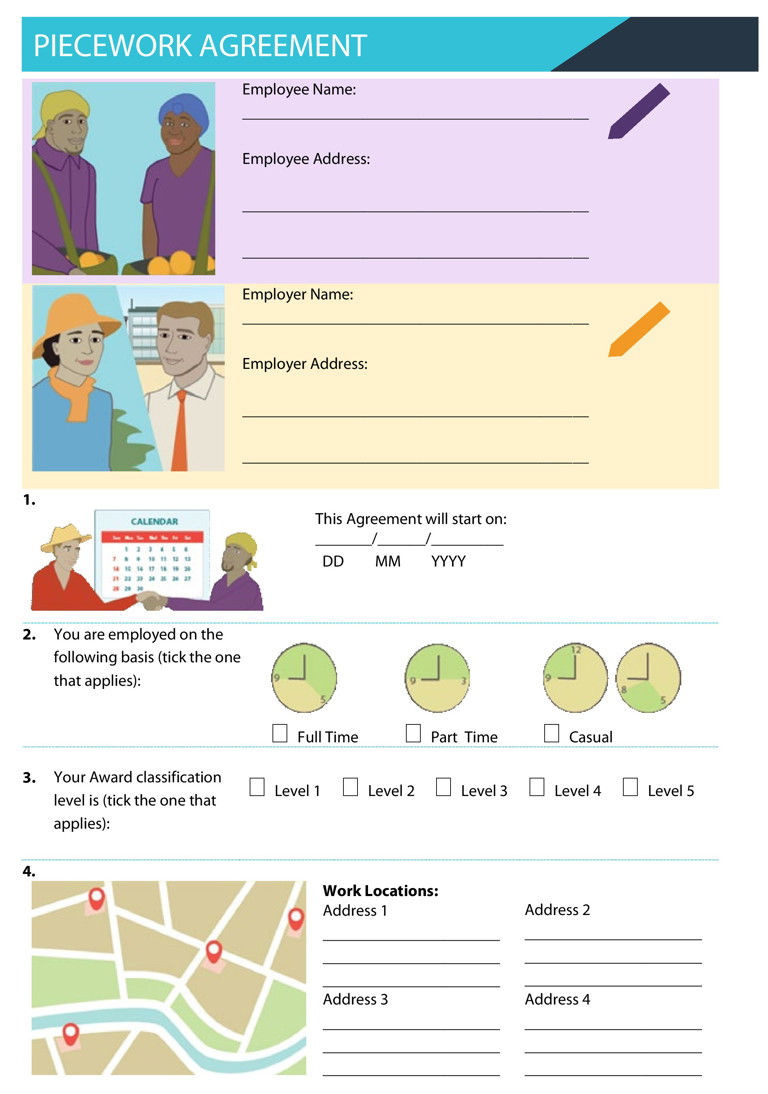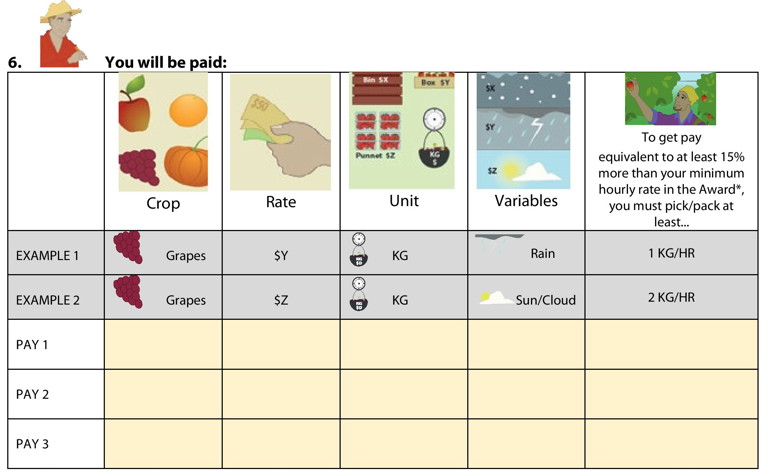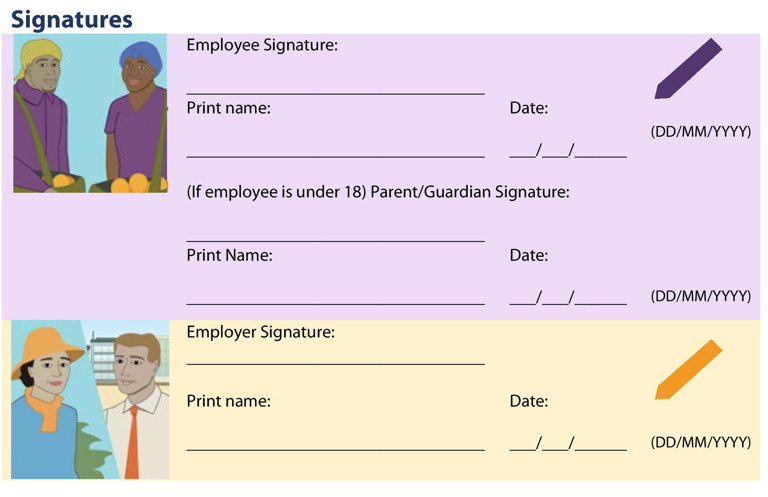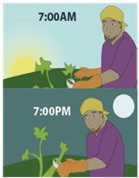Your work agreement
Use this template to help make a piecework agreement under the Horticulture Award.
This visual agreement template uses simple images and text to help employees, particularly those with low literacy, to better understand the rights and entitlements of a pieceworker under the award.

The agreement must set out the piecework rate for each unit or work produced.
ABOUT THE AGREEMENT
This Agreement is an example only. Other formatting is still considered valid provided it complies with the Award.
This is an Agreement to be paid by the piece.

You will be paid piecework rates instead of the hourly or weekly wages under the Award. You aren’t guaranteed minimum hourly rates or weekly wages.

The employer and the employee agree to enter into this Piecework Agreement (Agreement) under clause 15.2 (Pieceworkers) of the Horticulture Award [MA000028] (Award).

Because you’re a pieceworker, some clauses in the Award won’t apply to you. Those clauses are ‘ordinary hours of work and rostering arrangements’ (clause 13), ‘meal allowance’ (clause 18.3(c)) and ‘overtime’ (clause 21).

The more you pick, pack, prune or make, the more you get paid.

The Award says your Agreement must be in writing and signed by both you and your employer.

The Agreement must set out the piecework rate for each unit of work produced.

You must be paid for your work in money (by cash, cheque or EFT). Your employer can’t pay you with visa extensions, meals or accommodation.


For information about piece rates and Award requirements, visit

The Award says you must receive a copy of your signed Agreement. Your employer must also keep a copy of the Agreement.

Any changes to your Agreement should be agreed by both you and the employer and in writing.

PIECEWORK AGREEMENT
You may have more than one piece rate depending on what crop you are picking, packing or pruning, the unit that will be used to measure your work and a number of variables.
5. Duties you will perform under this Agreement:____________________________________________
______________________________________________________________________________________ (Insert duties in detail. An employee’s duties may, for example, include picking, packing, making or pruning.)

Crop: The type of produce you work with is called a crop (eg. apple, orange).
Rate: This is the amount you will be paid per unit that you pick, pack or prune.
Unit: You will be paid for every unit. For example, trays measuring (insert dimensions), boxes measuring (insert dimensions), by weight (KG) or something else.
Variables: Your piecework rate may change based on a number of variables such as the method of work you are using, the weather you are working in, or the condition of the crop you are working with.

Employer to complete the table. The employer must review the piecework rates regularly.
*Your piecework rate must be high enough to allow the average competent employee to earn at least 15% more per hour than the minimum hourly rate in the Award for your type of employment and classification level. If you are a casual employee, calculation of your piecework rate must also include the casual loading.
PIECEWORK AGREEMENT

8. Notes
Add any additional notes here (eg. authorised deduction arrangements):
If you are doing work not covered by this Agreement, you must be paid the minimum wages for your type of employment and classification level in the relevant Award.

Need help?
If you have questions about your job, you can always ask for help.

PIECEWORK GUIDE

Your rights
There are laws to keep workplaces fair and safe for everyone. They include:
- You must be paid for the work you do.
- No one is allowed to harass or discriminate against you.
- You should not be asked to work unreasonable additional hours. For example, additional hours may be unreasonable if you don’t get extra pay, or if the extra hours affect your health and safety.
- You cannot be forced or pressured into signing this Agreement.
- You must be given a pay slip within one working day of being paid. It needs to include details like your name and the amount you’ve been paid. Your boss needs to keep records about your employment too.

Hours of work
You may be required to work at different times of the day and night.
You should receive a:
- 10 minute rest break each day or shift you work
- 30–60 minute meal break on every day you work. This must be taken no later than 5 hours after you have started your shift
- break of 10 hours between finishing work on one day and starting work on the next day or shift.

Deductions
Taking money out of an employee’s pay is called a deduction.
A boss can only deduct money if:
- You agree in writing and it’s principally for your benefit, or
- It’s allowed by a law, a court order, or by the Fair
Work Commission, or
- It’s allowed under your Award, or
- It’s allowed under your registered agreement and you agree to it.
A boss cannot deduct money for things like visa fees or for damaged produce.
